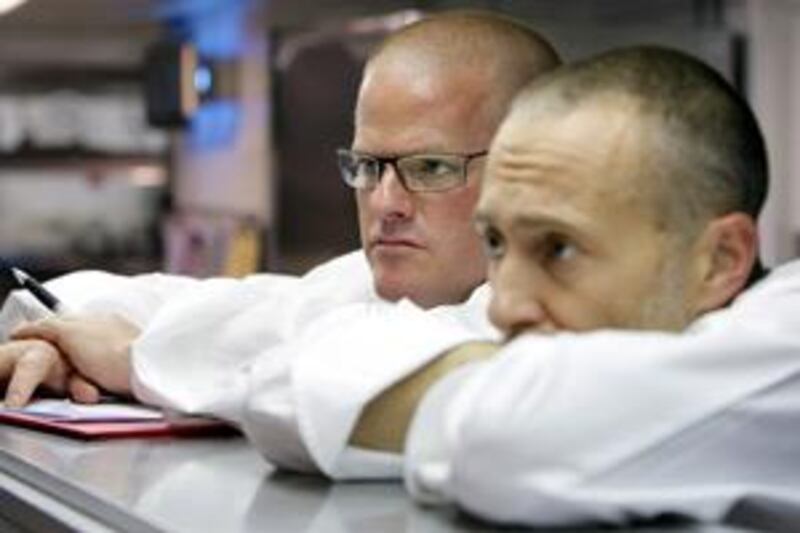"Is chicken OK?" asks my friend. Startled, I assure her that anything she makes for dinner tonight will be fine. When I'm invited out, I'm so happy to not be cooking that sometimes I can scarcely remember my preferences. These days, I'm feeling a lot of gratitude. It seems to manifest in a retreat from dialogue about the perceived links between food and, well, everything else. Attitudes are often thought to reflect behaviour. However, while attitudes and behaviour toward food have long been of anthropological and sociological interest, what is it that really determines - and connects - the two?
"My biggest fan" is a title that I facetiously bequeathed unto a cantankerous gentleman who regularly writes me sour notes in response to another column that I write. "Dear Nouf," a recent letter began. "As I read your review of XXX restaurant, at one time I had the sense that you were writing to aliens, and at another time I felt that you were writing for adolescents. Giving you the benefit of doubt, I'll assume that you were addressing the former." What my biggest fan doesn't know - besides the fact that I've already commissioned the ultimate devil's advocate in myself - is that I cringe at the thought of how few food-related topics out there are truly pertinent to everyone.
Nouvelle cuisine is a perfect example of this. Otherwise known as "molecular gastronomy", "avant-garde cuisine", "experimental cuisine", "techno-emotional cuisine", "progressive cuisine", "nueva cocina" and "culinary constructivism", it has always presented a special challenge for me. For the most part, nouvelle cuisine in the UAE and elsewhere has left me lukewarm. Nine times out of 10, a mantle of frothing emulsion on a steak is a happier prospect when it arrives on the side.
Nouvelle cuisine may have raised the bar aesthetically, but what about the gustatory ABCs: flavour, nourishment and satiation? What about the business of facilitating a better understanding of our food and its sources? In the end, I just want my food to be procured responsibly and to taste delicious. As with any art form, the best of nouvelle cuisine can urge us to re-evaluate our boundaries. Still, this can become far removed from what food is actually about, which can lead to a conflict of form versus function; mind versus matter.
How much novelty is required to awaken the senses of surprise and delight? Just a few months ago, a young and molecularly inspired German chef blew off both of his hands while attempting to cook for his girlfriend. Our appetite for more; more alchemy, more danger, and more of that emulsion in the ramekin on the side, has never been greater in the kitchen and beyond. Whether playful or academic in nature, "more" offers no quantifiable guarantee of superiority. In recent years, fine dining has focused less on ingredients - foie gras, lobsters, white truffles - and more on the experiential - things that are rarefied, albeit tasty, as a means to an end: ambergris, unusual cuts of meats, musk.
There's nothing new about the ongoing debates over the historical and stylistic legitimacy of molecular cookery. In 2006, a host of other chefs associated with this movement collaborated on a written manifesto about their culinary philosophy. "We do not pursue novelty for its own sake," it reads. "Our beliefs and commitments are sincere and do not follow the latest trend." The man widely acknowleged as the world's most innovative chef, Ferran Adrià from El Bulli in Rosas, Spain, and his contemporary, Heston Blumenthal from The Fat Duck in Bray, UK, have both spoken out against the term "molecular gastronomy". When asked why the term bothers him, Adrià said: "Well, for starters, it doesn't exist. That's the biggest lie out there in terms of cooking. What is molecular cooking?"
"Molecular gastronomy is dead," writes Jay Rayner. "Indeed, if Heston Blumenthal had his way it would never have been born in the first place." "Molecular makes it sound complicated," Blumenthal tells Rayner. "And gastronomy makes it sound elitist." Playing with food can get weirder - and more sordid. At Buns & Guns in Beirut, the theme is war, from the "Terorist" (sic) meal to the restaurant's disarming slogan "Sandwiches Can Kill You". Then there's Modern Toilet in Taipei, Taiwan, where patrons take a seat on - yep - modern toilets, and use toilet paper instead napkins to pat their lips after sipping from urinal-shaped cups. The trend of dining blind began at Blindekuh restaurant in Zurich, Switzerland, which became wildly popular on the premise that the deprivation of one sense enhances others. This led to copycat restaurants such as Pitch Black in Beijing and Dans le Noir in London and Paris.
As a child, I refused to eat thumbprint cookies, which disgusted me on the simple - and silly - basis that the cookie's namesake is a depression in its centre left behind by a finger. Knowing one's prejudices - and owning those prejudices - isn't a piece of cake. But the chefs who deserve the real kudos from diners are the ones who elevate the medium of food into an art form, and by doing so, risk modifying their role as technical cooks into creative ones: magicians, artists, scientists, geniuses, failures - thus risking the kind of judgment that jeopardises those with a lot at stake. But I will still take a well-made Dh2 falafel sandwich almost any day of the week.






